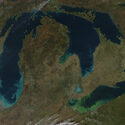Environment
-
Coping with the personal aftershocks of disaster
A study on survivors of 2011’s triple disaster in Japan reveals options to help prevent and protect against the violence that often follows such events.
-
Net-zero water consumption
Imagine a home that had walls filled with water, toilets that composted their own waste, and a roof capable of disinfecting water through the sun’s UV rays. Now imagine a team of engineering students retrofitting one Ann Arbor home to achieve net-zero water consumption.
-
Sustainability Progress Report highlights U-M's achievements
Sustainability research funding at U-M is up by 200 percent since 2003. Sustainability faculty and courses are increasing too.
-
U-M Launches Great Lakes Restoration
A new research and education center will guide efforts to protect the world’s largest group of freshwater lakes.
-
Quick-Cook Method Turns Algae into Oil
Video: Engineering researchers have discovered how to “pressure-cook” algae for as little as a minute and transform an unprecedented 65 percent of the green slime into biocrude.
-
Climate Change to Increase Lake Erie "Dead Zones"
Climate change is expected to increase the frequency of intense spring rain storms in the Great Lakes region this century and will likely add to the number of harmful algal blooms and “dead zones” in Lake Erie, unless additional conservation actions are taken, according to a U-M aquatic ecologist.
-
Solar Car Team Wins Again; Breaks National Record
In July the U-M Solar Car Team won the 2012 American Solar Challenge for a fourth consecutive American title. It was a record-breaking run, as the team finished the race with a 10-hour, 18-minute lead on the competition.
-
American Gothic: Detroit Style
“I forget that this is weird,” says urban farmer, entrepreneur, and alumna Carolyn Leadley, sitting in the shade of a mulberry tree next to her large market garden on Detroit’s east side. Leadley and husband, Jack Van Dyke, are working the land while working a hypothesis: Can urban agriculture be a viable business?
-
Not just monkey business: cooperation vs. competition
Leaders take note: A new study of gelada monkeys indicates that being the top dog—or in this case, top monkey—is even better if the alpha male occasionally concedes to subordinates.








